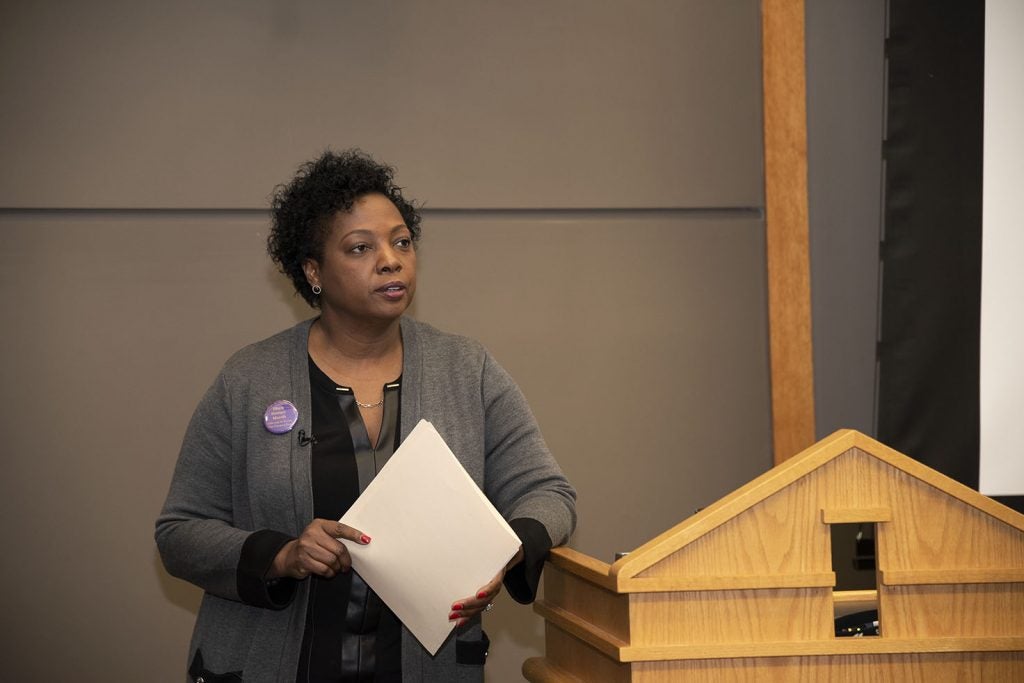Celebrating the Journey: College of Nursing Black History Month focuses on overcoming fear
The College of Nursing celebrated Black History Month with a keynote address and a roundtable discussion with black nursing students, alumni and community members on Feb. 6.
Keynote speaker Dr. Sharona Johnson completed her PhD at the ECU College of Nursing and is a nurse of nearly 30 years, with experience working as a bedside nurse, a flight nurse and an intensive care nurse. She is now the director of advanced clinical practice at Vidant Medical Center and maintains a clinical practice as a nephrology nurse practitioner with ECU.

Inspired by letters she received from her grandmother in college and letters written by Dr. Martin Luther King, Jr. and Nelson Mandela, keynote speaker Dr. Sharona Johnson framed her speech titled “Our Greatest Fear” in the form of a letter. (Photos by Conley Evans)
Inspired by letters she received from her grandmother in college and letters written by Dr. Martin Luther King, Jr. and Nelson Mandela, Johnson framed her speech titled “Our Greatest Fear” in the form of a letter.
In her letter, Johnson shared with the audience the fears she faced growing up, recalling a time in the seventh grade when she doubted what she had to say mattered. She shared stories about abolitionist and political activist Harriet Tubman and Mary Mahoney, the first professionally trained African-American nurse, and the doubts and fears they must have faced as they pursued their destiny.
“I’ve heard many times that a journey of a thousand miles begins with the first step,” Johnson said. “It doesn’t. The journey of a thousand miles begins with a thought that you can take that step. I’m a true believer that your thoughts become your words. And your words become your actions. And your actions become your habits. And your habits become your character. And your character becomes your destiny.
“We saw that with Harriet Tubman. We saw that with me in the seventh grade. We saw that with Mary Mahoney.”
As Johnson discussed the external forces and voices that can seed the doubts and fears in our minds, she spoke of her life growing and the odds that were not in her favor.
She was the child of a teenage mother and a father who struggled with bipolar disorder, substance abuse and who was ‘in and out of jail.’ She shared statistics from the National Institutes of Health and the Centers for Disease Control about the likelihood of children like her facing developmental issues, domestic violence and behavioral problems.

From left, Dr. Sharona Johnson, Dr. Gwendolyn Tyson, Courtney Warner, Mecca Bowser, Felicia Collins, Dr. Kimberly Hardy and Dr. Daphne Brewington participated in a roundtable discussion sharing struggles and successes during the College of Nursing Black History Month celebration.
She shared that an instructor in nursing school told her she should consider another career because she wasn’t smart enough to be a nurse. But when she transferred to a different school, she met a faculty member who inspired her.
“One thing she said was ‘Sharona, you do not have the right to deprive little girls who look like you of your legacy.’
Johnson’s speech was followed by a roundtable discussion in which participants Dr. Daphne Brewington, Dr. Kimberly Hardy, Felicia Collins, Dr. Gwendolyn Tyson, Mecca Bowser and Courtney Warner emphasized the importance of authenticity, knowing oneself and caring for yourself in the pursuit of success. They also relayed how crucial it is to have diversity in faculty and staff.
-by Natalie Sayewich, University Communications